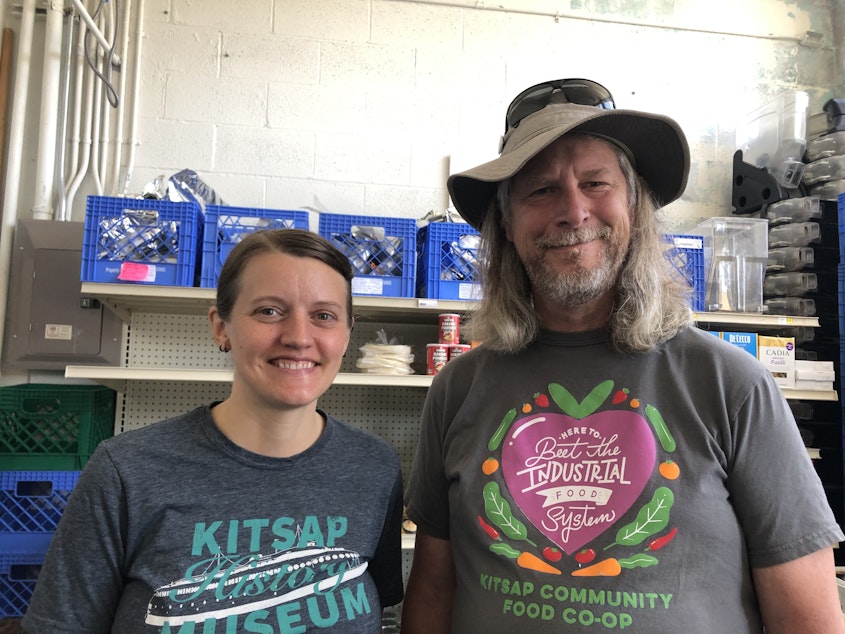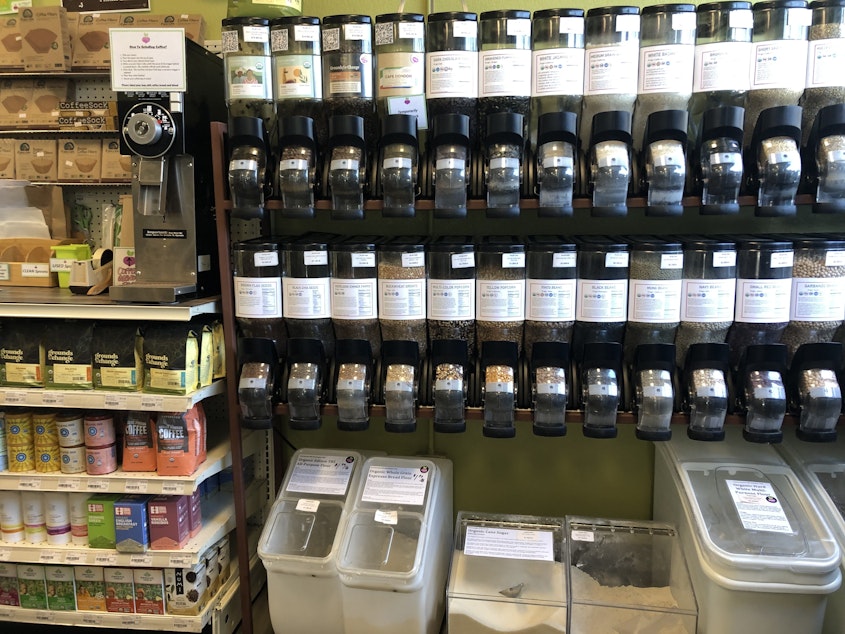The little Kitsap co-op that could

Only a handful of companies dominate today’s grocery landscape. And that could shrink even more if regulators approve the Albertsons-Kroger merger. Increasingly communities like Bremerton, where stores are already scarce, are looking to food co-ops as an alternative model.
On a sunny Saturday afternoon, Kahala Pantohan is paying for her purchase at Kitsap Community Food Co-op. Pantohan has lived in the area for three decades, but this is her first time at the co-op. She normally shops at the supermarket near her work, but lately she’s trying to buy more locally produced food.
“I’m willing to spend a little bit more,” Pantohan said. “I’m at that phase in my life where I can afford to, and willing to help my local farmers and growers and everybody.”
Plus, she wants to make sure the money she spends stays local.
The co-op is about the size of a small convenience store. A good portion of the space is devoted to bulk ingredients like coffee, grains, and dried fruit. Locally grown produce features prominently near the store entrance.
For years, downtown Bremerton had a grocery store problem — it didn't have one. The last grocery store closed in the '90s. A group of residents dreamed of starting a food cooperative complete with a deli case and more, but making it happen was harder than they thought.
Sponsored
“This idea started in 2008,” co-op President Jeff Allen said. “And if you recall, there was an economic downturn in 2008.”
The economic downturn wasn’t the only hurdle. A bigger issue, Allen says, was having to explain to people what a cooperative is and how it works. That’s still the case today. This affected their ability to raise capital.
”We got to a point where we decided we needed to just start selling food. And so the board of directors at the time made a decision to start a pop-up store, literally in a restaurant next door in their back area seating.”
The pop-ups generated just enough to open a permanent store in 2019, just seven months before the pandemic hit. Interestingly, Allen said, the pandemic helped the co-op. It thrived. During lockdown, he said, people thought about community, and about supporting local businesses.

Sponsored
Food co-ops have been around for some time. But in many ways, the Kitsap store represents a third wave in the evolution of cooperatives.
“There’s the first wave of co-ops coming out of the Depression,” said CE Pugh, head of National Co-op Grocers, a business group for retail co-ops. “The second wave is a natural and organic group that opened a lot of stores in the '70s and '80s. And this new group is what we think of as the third wave which is more about access.”
Pugh says part of today’s start-ups are driven by need, when a community feels neglected by the big stores. He says cooperatives have been growing steadily in the past decade. Currently, National Co-op Grocers serves 159 co-ops around the country. And they’re finding ways to compete against big box stores through purchasing co-ops.
“It turns out that wholesalers and manufacturers, they don’t like being beholden to these monopolies. It’s in their interest to strengthen local businesses and smaller businesses.”
Pugh says co-ops won’t be less expensive than the big chains, but they can compete on service and quality.
Sponsored
One of the goals at Kitsap Community Food Co-op is to make shopping affordable to low-income families. This is a priority since Bremerton has one of the highest counts of people on public food assistance in the county.
Board member Mary Phelps says the co-op started a program that helps members on public assistance by giving them a 10% discount on groceries.
“It’s our way of acknowledging that the people that need that assistance should have as equal right as everyone else to be able to have that high quality food.”
Phelps says this program was something that she learned from other cooperatives. And that’s the thing about cooperatives — they’re technically competitors. But instead of competing against each other, they come together to support each other.




